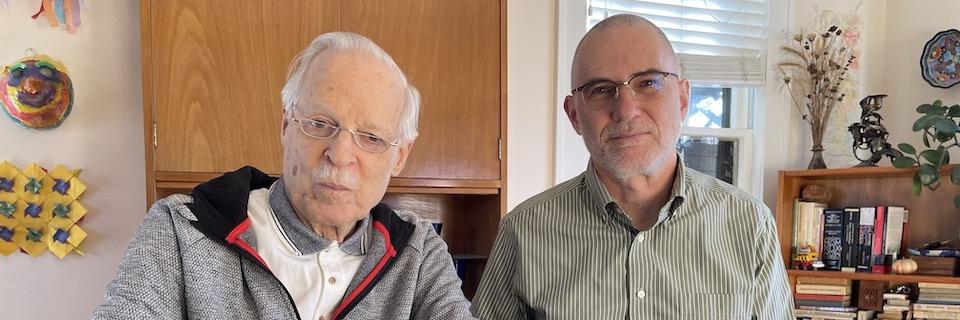Faculty Explores the Universe, Alongside His Father, in New Article

You don’t need an astrophysicist father to understand the cosmos. But it doesn’t hurt.
Keith Brandt, Ph.D., professor of mathematics, and John C. Brandt, Ph.D., a retired astronomer, are the authors of an upcoming article in the AMATYC Educator titled “Andromeda’s Distance: An Activity in Exponential and Logarithmic Functions,” which explores the relatively simple mathematical principles that in 1923 allowed Edwin Hubble to determine that Andromeda actually lies outside the Milky Way Galaxy — something that, at the time, was a major scientific discovery.
“Our precalculus class focuses on modeling, the art/practice of finding a mathematical formula that describes some real-life situation,” Keith said. “Then we can use the formula to study the situation. I am always on the lookout for example applications that fit within the topics for the class.”
He said he stumbled upon a video about Andromeda and had a hunch the math was relatively elementary. But he needed to brush up on the astrophysics. He called dad.
John “Jack” Brandt, Keith’s father, is a retired astronomer who at one time was a principal investigator on the Hubble Space Telescope project. Jack said the idea evolved from casual conversations between the two about the nature and method of Hubble’s discovery. Jack said he brought that firsthand expertise, as well as a sense of the history of astronomical discovery, to the project. With that knowledge and experience, Keith developed a classroom-tested activity based around the case, using feedback from his students to write the article outlining the concepts and how to lead a similar activity.
“We made a good pair,” Keith said. “Jack was the expert in astronomy, and I was the expert in teaching mathematics.”
They collaborated in the writing process. Working with his father in such a way was a new experience, Keith said, but one that was rewarding in how it underscored what they share — Jack was, after all, a mathematics major as an undergrad.
“Mathematics is the language of science,” Jack said. “It’s one of the most important tools used in science and engineering, and it goes way beyond the things that people encounter in their everyday life.”
But more than an interest in the way that numbers can be used to better understand the universe, the experience underscored a familial bond that extends way beyond the realm of math. Jack said working with his son was a pleasure.
“I’m a proud father. It was absolutely wonderful to be doing this work with my son,” he said. “What he’s grown up to be has been a source of pride for the family.”
Similarly, Keith said he believes that his father passed on broad-based interests that influence his work in the classroom and in his research.
“I would say he influenced me mostly to be curious about everything, not just math and science,” he said.







